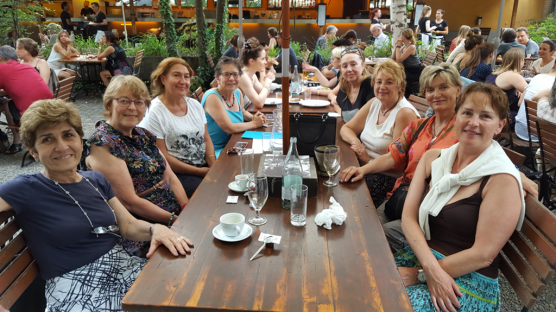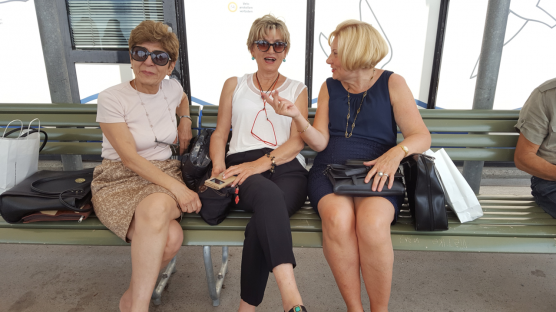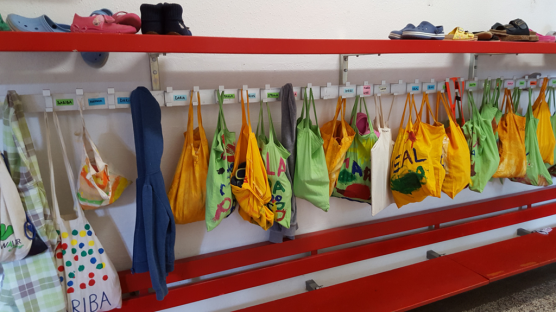International Meeting in Zurich between the Turkish Association of University Women (TAUW) and the Swiss Association of University Women (SVA). Programme 20 – 24 June 2017
The idea of this meeting all started at the Cape Town Conference in 2016, at an informal dinner between delegates from the Turkish and Swiss NFAs. Why not organize an event between our two associations that would focus on the educational, social and constitutional models of our countries? Two weeks later we receive an initiative of suggestions from our Turkish Association, and the planning begins. Dr. Karoline Dorsch, President of the Zurich Association and SVA CIR drives the tasks and organization at hand, together with Prof. Katharina Strub, GWI Treasurer and Sheila Buemi-Moore, Member of the Commission for International Relations (both from Geneva) and on 20 June 2017 we are delighted to greet the members of the Turkish Association:
Prof. Gaye ERBATUR, TAUW President
Gülen CETIN, TAUW Vice President
Perihan TÜLÜCE, TAUW Secretary of the Board
Dr. Serap MAKTAV, TAUW CIR
Prof. Dr. Gönül BALKIR, TAUW Executive Board member
Day 1
Our hosts arrive and are greeted at the airport by Karoline Dorsch. A walking tour of the city in the afternoon shows different landmarks and finishes at Reithalle, in the garden restaurant. Katharina Strub and Sheila Buemi-Moore, greet them in the early evening for the welcome reception.
Day 2
Our programme for the day was busy. In the morning our SVA President, Doris Boscardin, joined us with members Elsbeth von Navarini (former GWI Treasuerer, from the Grisons Section), Verena Müller and Andrea Linsmayer (both from Zurich). We were received by Seline Fischbacher, Deputy Head of the Office of External Relations at the State Chancellery of Zurich. Our purpose was to provide a presentation on Swiss democracy, one of the oldest direct democracies in Europe promoting federalism. Seline Fischbacher underlined the importance of how democracy and federalism work together in Switzerland. She presented the three levels of the Confederation, comprised of federal, cantonal and communal powers. The first Swiss Constitution was promulgated in 1848 and was based on the American model. It was important for the cantons (states) to retain their sovereignty and to maintain and promote diversity, multilingualism and the protection of minorities within the country. Revisions either partial or total were introduced progressively. It was not until 1971 that equal rights for women were introduced at a Federal level.
The Swiss model of government underlines the importance of consensus and integration rather than opposition. The Federal Council is represented by a college of 7 members, each of which heads a government department. The Federal Council is elected by the two parliamentary chambers and their tasks are laid out in the Federal Constitution.
What is the proportion of women in Swiss Parliament? In 2015 women represented 32% of its 200 members in the National Council and 7 out of 46 in the Council of State. In 2010 women reached a majority in the Federal Council, obtaining 4 out of 7 seats.
In Turkey, the proportion of women in Parliament represents 14% in spite of the introduction of full universal suffrage in 1934, well before that of Switzerland.
Our delegation was then greeted by the Office for Gender Equality of the Canton of Zurich, a branch of the Department of Justice and Home Affairs. Alexandra Imbach and Yannick Staubli presented their mandate to eliminate discrimination as well as other projects and activities focusing on the social and economic inclusion of diversity. One of their studies highlighted the impact of gender stereotypes: when seeking employment, 75% of men choose from 31 different jobs whereas 75% of women choose from 14 different jobs.
To manage and change the perception of gender roles, Alexandra Imbach and Yannick Staubli are working at all age levels. They have introduced amusing activities through a game called “Job Matcher” that defies classic stereotype thinking by highlighting society’s tendencies to associate women to care giving roles and men to technical ones. This game surprises in a playful way that gender should not be the criteria to choose a profession. This has been introduced at primary schools and workshops are organized at secondary schools as well as within professional circles. Other workshops focus on “work-life balance”. The canton of Zurich is an important employer of the country and studies of the employment market have shown that in the working situation an 18% wage difference between men and women exists. Factors such as education, experience, hierarchy and seniority can meet objective criteria to explain this difference. However, 8.7% cannot be explained using the same measured criteria for the same function. Gender still plays an important role at the work place. Service is offered to NGOs and firms in the private sector and some of the latter sign charters to reduce the wage gap. The pillars of equality promoted are:
1) Choice of profession
2) Work-Life Balance
3) Equal Salary, and
4) other factors such as individual and institutional counselling against discrimination and sexual harassment, speeches, diversity and inclusion events.
Our meeting ends with an invitation to a lunch cruise on Lake Zurich.
After a stroll through the old town we headed towards the Municipal Council, the Parliament of the City of Zurich. We were able to follow a busy session of Parliament from the grandstand. The Council is elected every four years by the voters of the City of Zurich.
In spite of the long day and very warm weather Verena Müller, a historian and expert of women’s history, treated us to a lovely tour explaining the surrounding landmarks, archaeological remnants of former Roman baths along with historical anecdotes on some of Zurich’s famous and historical figures.
Day 2
University of Zurich (UZH): Diversity and Equality at UZH, Office of Gender Equality.
The objective is to reach equality of women and men to ensure a balanced representation of both sexes in all university functions be it research, teaching and/or administration. Dr. Christiane Löwe, Head of the Office for Gender Equality, promotes and manages opportunities to reach these goals. Tanja Neve-Seyfarth who works for the Office of Gender Equality provided a first presentation on Academic Career Development and Life Balance at UZH which explained the legal basis, facts and figures and the priority topics to manage and change such as unconscious bias. In December 2016, a study at the university showed that 79% of professors were men while only 21% were women whereas the positions of assistant professors showed 22% of men and 78% of women. Problems clearly begin at the post doctorate level and up. There is a Code of Conduct on Gender Policy to support the implementation of objectives to counsel and support in the areas of child care, part-time employment and provide equal opportunity tool kits. Funding levels for research are now under study to provide for new opportunities and academic careers. Of course, the issues often voiced centre on Life Balance obstacles. The current working models are not conducive to parenthood.
Dr. Löwe provided a presentation on the University of Zurich and the importance to define priorities towards structural and not just cultural and unconscious bias. UZH was founded in 1833 and the first woman to hold a PhD in medicine was in 1864. Today the university has 57.01% female students. Progress of female professors is slow but increasing. She discussed the UZH Gender Equality Action Plan 2013 – 2016 indicating measures to reach goals for more women in positions of professorship or leadership roles. The new Action Plan 2017 – 2020 has three main projects:
Project 1: Open, transparent and merit-based recruitment of researchers
Project 2: Research funding and academic careers
Project 3: New organisational models for part-time management positions at UZH.
What are some other measures needed to do to gain more global influence? Show best practices between universities (statistics) and introduce day care centres. On a legal basis, the Charta document lays down the recognition and need to reach compatibility between family responsibilities and academia.
Dr. Christiane Löwe invited us to the tower of the University which, in addition to a lovely lunch offered a beautiful view over the city, its lake and mountains.
Kunsthaus, Zurich, a cultural visit toone of Zurich’s major art museums offered an impressive collection with many Swiss artists such as Hodler, Segantini and Alberto Giacometti’s statues. Then of course the sheer delight to see the works of several masters such as Monet, Van Gogh, Degas, Cézanne, Picasso, Dali and Magritte.
A short stroll through the gardens of Villa Tobler located in the old town revealed a dragon fountain with a gold coloured mosaic. Just next to this Villa was our final meeting for the day.
Meeting with members of the Zurich branch and other branches of Switzerland.
Participants: Dr. Maria Bühler, Dr. Karoline Dorsch-Häsler, Prof. Doris Edel, Lisa Hierlemann-Aebi, Andrea Linsmayer, Dr. Claudia De Morsier, Prof. Ana Celia Mota, Verena Müller, Angelika Spanke, all from Zurich; Prof. Sheila Buemi-Moore and Katharina Strub from Geneva.
Susan A. Peter introduced the meeting with her presentation “A day in the life of the Zurich Violetta Women’s Refuge”. Susan A. Peter is manager of the Foundation of Zurich Women’s Shelter (Violetta Haus) founded in 1980. It is a crisis intervention centre that fights against domestic violence and human trafficking 24 hours a day, 365 days per year. Switzerland has 15 women shelters and all are financed through private funding. State-run women shelters do not exist nor does a State-wide strategy to combat violence. Development has nevertheless advanced by securing international agreements, such as the European Convention on Human Rights as well as developments within the Penal Code, Civil Code and other legislation in Zurich. Statistics from different sources such as the UN or the WHO publish reports showing that 35%, i.e. one of three women falls victim to physical violence in all social classes, nationalities and age groups. Unreported cases are still high but progress has been made to eliminate the taboos.
The shelter offers, inter alia, 24 beds, high security standards, psycho-social and juridical assistance and socio-pedagogical support for children.
The raison d’être of women’s shelters is multiple: escalation of violence, the abuser wasn’t seized, there is a threat that additional people might resort to violence, laws aren’t effective as protection, the hazard potential is high, the woman needs comprehensive support, forced marriage and human trafficking. The risk factors for women and their children include traumas, addictions, poverty, isolation, dominant behaviour, among others.
Most women stay on average 21 days. Three out of 5 are mothers with children usually between two to five years old. 35% of the women are Swiss and 65% are of other nationalities. Approximately one third return to the Women’s Shelter.
Once the women leave the centre they remain in contact and the centre continues its support. Depending on the situation at hand it may be social, psychological or legal.
The end goal for each person is to leave the shelter strengthened, resilient with a life free of violence. The effects of domestic violence can impair the ability for empathy and later on become an abuser. The damage costs are not only financial but also social. It is not violence that will improve situations but civic commitment and daring to resist.
Our next topic turns us to our own Associations – An Introduction on the work and functioning of TAUW and SVA.
Professor Gaye Erbatur, President of TAUW explained that TAUW was established in 1949 and has 24 branches comprising of a total of 1,100 members. Ataturk was the first President of the Republic of Turkey, a democratic, secular, parliamentary republic with a diverse cultural heritage. Our civil code is based on that of Switzerland. What are we doing to empower women?
Education is a tool against violence. The major obstacles women face in Turkey concern violence and lack of presence at decision-making levels. Child marriages also hinder education for about one third of girls under 17 years old. On the one hand women need to think big and not cut themselves back so that they fit their career into their family. On the other hand, society is not conducive to help fulfil their roles. Frequently women must rely on grandparents for child care during their studies. Either day care is too expensive or it does not exist. TAUW plays an active role promoting education for girls and women. Those women who are retired can support the cause and they are very helpful. Of course, younger members are needed. The President, who was first elected in 2014, investigated that the average age of members was 56.
Scholarships are promoted through TAUW for students not just on a pecuniary basis but also to develop friendship. Some branches raise funds for mentoring. When these students graduate, we ask them to mentor younger members. Other branches of TAUW promote human rights and with the current changes in government women are actively working to maintain and promote their rights. Turkey has changed its constitution and the impact on new legislation, human rights and the judicial system is not beneficial to women.
Joint project with the European Union: Our branches obtain project funding to enhance skills for women in different areas, be it jewellery, marketing or even opening a kindergarten. Our members are helping to train and encourage them.
On a human rights level, we are taking positions with other NGOs against governmental decisions so we are working actively for fear of losing our rights. Abortion laws are changing, honour crimes and murders of women are increasing. The judicial system has become worse as the President appoints all judges in the Supreme Court. This is new. There is a direct connection between women’s rights and modernity and development. It is important for women to remain active citizens and claim their rights through education.
Regarding university studies, it is interesting to note that in contrast to Europe, the academic studies women pursue in Turkey concentrate in the field of sciences.
Dr. Karoline Dorsch, President of the Zurich Association, explained that the SVA has about 650 members and 9 sections but its membership has aged considerably. The average age has been calculated at 70 years. The SVA’s main goal is to promote equality both academically and professionally. The Association participates in the Equal Pay Day initiative and this year’s special topic is women and STEM (Science, Technology, Engineering and Mathematics), aiming to encourage more women to study in these fields. It also develops its own fund raising to support projects aimed at the education of girls. Cultural meetings are appreciated as well as formal meetings organized by Graduate Women International (GWI), the University Women of Europe (UWE) and the annual informal DACH meeting of the German-speaking NFAs (Germany, Austria and CH).
The main concerns facing our associations point to membership and involvement. The Zurich Association has 120 members but only 20 to 30 members actively participate. We would want members to be more active but this is difficult given the age factor (most of them are grandmothers). We clearly need younger members and are working on that. Dr. Dorsch proposed to organize a brainstorming session on the issue.
Day 3
Visit of a primary school.
Our delegation was greeted by the Principal and teaching staff. The atmosphere was relaxed but busy. In Switzerland the educational system is a government responsibility, both cantonal and federal. School is compulsory for eleven years. The primary cycle lasts eight years, including two years of kindergarten and the lower secondary cycle lasts between three to four years. The post-compulsory education begins with gymnasium or vocational education and training apprenticeship which is an additional three to four years. The tertiary level of the Swiss educational system can be completed at universities or at higher professional or education training institutions.
At this primary school, the children first learn sounds and then how to read them. Each class holds roughly 20 pupils and 30% are foreigners. The school integrates special needs.
During a visit of the classrooms it was noticed that the pupils are often seated in circles and choose their own places. All children actively participate. The main issues teachers initially face are not gender specific but related to agitation. The gender roles become decisive around the age of eight or nine and work for improvement is essential but complex.
Final Dinner.
Dr. Karoline Dorsch invites our Turkish members to her home to relax or take a swim in Lake Zurich. A wonderful Turkish dinner was prepared, thanks to our Turkish members and a Turkish friend of theirs living in Zurich.
We finish our exchange in Switzerland on a positive note. Of course, we have already identified room for improvements but we encourage future meetings on an international level to develop cooperation and human rights that are seriously challenged in today’s rising violence.
On behalf of SVA it is with great pleasure to thank the TAUW delegation for their visit, to learn about their active work to eliminate discrimination and to contribute towards gender equality through education. We appreciated their reflexions and questions about the Swiss model and learned about theirs. Last but not least we express our appreciation of their unflagging, generous and treasured friendship.
Sheila Buemi-Moore
SVA Member of the Commission for International Relations
Istanbul – 31st Triennial Conference, 16–21 August 2013
A l'Assemblée triennale de la FIFDU à Istanbul, l'ASFDU était représentée par une dizaine de membres, dont 4 déléguées. Une nouvelle présidente mondiale y a été élue pour 3 ans: Catherine Bell, d'Afrique du Sud. Nous avons le grand honneur d'être représentées au Comité de la FIFDU par Elsbeth von Navarini, élue comme trésorière.
Une décision d'importance primordiale quant à la gestion de l'Association – qui se trouve en difficultés financières – a suscité de vives discussions. L'Assemblée a finalement opté pour le maintien d'un bureau personnalisé à Genève plutôt qu'un «outsourcing».
Verena Welti, Prösidente
Rapport d'Istanbul d'Anita von Arx, présidente de la Commission des relations internationales de l'ASFDU: PDF 298 KB (en allemand)
Atelier sur la conciliation de la vie professionnelle et familiale, rapport de Verena Welti, présidente de l'ASFDU: PDF 65 KB
Atelier sur la «Conciliation de la profession et de la vie familiale» : enquête auprès des sections de l'ASFDU 2011/2012
Lors de l'Assemblée de la FIFDU à Mexico, une résolution, présentée par l'ASFDU et concernant la conciliation de la profession et de la vie familiale touchant de près les jeunes diplômées de l'université a été adoptée. En préparation de l'Assemblée de la FIFDU de 2013 à Istanbul, l'ASDFU a lancé une enquête auprès de ses sections. Ses résultats représentent le degré de prise de conscience du problème par les sections et ne prétendent pas à une représentation scientifique de la problématique.
Les résultats présentés par les sections francophones sont publiés en français.
La présentation succinte des résultats des recherches détaillées ou des sources officielles présentés par les sections est due aux bons soins de la secrétaire de l'Association Livia Boscardin que nous remercions pour son efficace travail de synthèse (PDF 494 KB).
Verena Welti, présidente de l'ASFDU
GWI Conference 2019
Rapport du congrès du GWI du 25 au 28.7.2019 à Genève
par Tatjana Betschart, CIR
Le congrès du GWI avec l'assemblée des déléguées, la conférence et le centenaire qui s'est tenu du 25 au 28 juillet 2019 à l'Université de Genève a remporté un franc succès. La journée de conférence ouverte au public comprenait des présentations et des ateliers et était placée sous le thème «Peace Through Education». Un programme varié avait été élaboré pour les quatre cents participantes issues de plus de 50 pays ; ainsi, durant les deux journées d'assemblée générale, les déléguées ont été invitées à la Centenary Celebration ainsi qu'à la Swiss Culture Night. Tous ces évènements ont été l'occasion idéale de discuter avec des femmes venues des cinq continents.
L'assemblée générale a été dirigée par Geeta Desai et ses collègues du Board du GWI. Leur travail des trois dernières années a été chaleureusement remercié. Les élections dans les organes du GWI pour 2019 à 2022 ont également eu lieu. Terry Oudraad du GWI aux Pays-Bas, a repris la présidence du GWI. Les vice-présidentes ainsi que les autres membres du Board of Officers ont également été élues. L'ASFDU est très bien représentée dans le Board du GWI par Katharina Strub (section de Genève) en tant que Treasurer et par Karoline Dorsch (section de Zurich) en tant que nouvelle Assistant Treasurer. Une autre information importante a été communiquée lors de l'assemblée, à savoir que la situation financière du GWI s'est redressée.
La Suisse en sa qualité de pays hôte a été très présente tout au long du congrès. Doris Boscardin, présidente de l'ASFDU et présidente du Local Arrangements Committee LAC, a tenu un discours très réussi pour souhaiter la bienvenue aux participantes. L'excellente organisation de l'évènement peut être essentiellement attribuée au travail du LAC. Durant une année et demie, Doris et Livia Boscardin, Karoline Dorsch, Stacy Dry Lara, Susanne Leber, Ruth Nieffer, Lilia Müggler et Katharina Strub ont travaillé à la préparation de cet évènement.
Une vingtaine de Suissesses issues de différentes sections, dont plusieurs des Grisons, ont été présentes en tant que bénévoles durant l'ensemble de la manifestation. Elles ont assuré le bon déroulement de l'assemblée des déléguées, de la conférence, des festivités et des excursions.
En lisant les quatre contributions de membres de la section des Grisons, vous constaterez par vous-même que ce congrès a constitué un évènement mémorable.
Rapport sur l’engagement des bénévoles au congrès du GWI du 25 au 28.7.2019 à Genève
par Ruth Nieffer, section GR
Le bâtiment d’Uni Mail à Genève dispose d’une cour intérieure impressionnante, qui baigne dans la lumière du jour qui pénètre à travers le toit de verre. C’est depuis cette cour que l’on accède aux différents auditoires et salles de séminaire. Ce lieu a été le point de rencontre des quatre cents participantes à la 33ème conférence triennale du GWI. A l’assemblée générale et à la conférence à Genève est encore venu s’ajouter le centenaire du GWI. Pour nous, les bénévoles, Uni Mail a également constitué notre lieu de travail.
Chaque matin vers 8h30, les premières participantes arrivaient, leur sac beige avec le logo du GWI sous le bras. Une heure plus tôt, nous nous étions déjà inscrites dans la liste des bénévoles présentes avant de monter la table d’information et de disposer les panneaux explicatifs. Notre petit groupe était constitué de femmes issues de différentes sections de l’ASFDU. Nous portions toutes un foulard blanc en guise de signe distinctif et étions équipées d’un manuel destiné aux bénévoles.
Nos deux tâches principales consistaient d’une part à veiller à ce que les participantes se rendent dans le bon auditoire au bon moment et, d’autre part, à trouver des réponses aux diverses questions sur la conférence et le programme cadre. La première tâche n’a pas représenté de réelle difficulté pendant l’assemblée générale; tout le monde n’avait qu’à se réunir dans le plus grand auditoire. En revanche, le programme dense des ateliers sur la conférence «Peace through Education» a grandement sollicité notre sens de l’orientation. Heureusement que nous avions fait un repérage des lieux au préalable!
Notre table d’information située à l’entrée d’Uni Mail a toutefois constitué le pivot et la clé de voûte. Nous avons inlassablement répondu aux questions et nous nous sommes occupées des préoccupations personnelles des participantes : les questions portaient sur le programme, l’emplacement de la cafétéria ou des toilettes, sur les attractions touristiques ou sur les transports publics. Les participantes souhaitaient aussi savoir à combien correspondait un franc suisse dans leur propre monnaie ou s’il allait faire beau temps pour le dîner sur le bateau à vapeur. Une autre question récurrente portait sur le wifi : comment s’y connecter ? Puis, il y avait bien entendu les objets perdus, respectivement trouvés: a-t-on retrouvé mes lunettes ? et mon téléphone portable? Et ainsi de suite.
Ces quatre journées de brouhaha babylonien ont été fatigantes, mais aussi enrichissantes, car nous avons pu participer à l’un ou l’autre point du programme ou parler avec certaines participantes – y compris avec nos propres camarades! – de leur parcours professionnel ainsi que de nos similitudes et différences sociales et culturelles.
L’évènement du GWI appartient déjà au passé, la table d’informations est pliée, le foulard blanc est rangé, le manuel gît au vieux papier. Ce qui demeure, ce sont les rencontres cordiales et la gratitude des participantes dont la visite à l’Uni Mail a été une expérience positive, grâce à notre engagement bénévole.
Meeting du GWI à Genève - Rencontres et impressions
par Marcelle Einsiedler, section GR
C’est en guise de complément au récit de Ruth sur l’engagement des bénévoles que je souhaite partager ici quelques rencontres et impressions. Outre nos tâches de bénévoles, la possibilité nous fut offerte d’assister aux conférences et aux tables rondes sur «Peace through Education» et de rencontrer des femmes du monde entier.
Je me souviens de Magda. La jeune Américaine d’origine congolaise se tenait toute excitée dans le couloir ; les paroles jaillissaient de sa bouche, elle avait le trac : « Il faut dire les choses, c’est pour cela que je suis là ».
Il y avait aussi Zamaswazi Dlamini-Mandela, qui, bouleversée, essayait de se maîtriser: «The very strong values in our familiy: hope and generosity», la distinction fine qu’elle faisait entre «education» et «quality education» et l’importance qu’elle donnait des livres.
La personne qui m’a le plus poussée à la réflexion fut Adiba. La jeune femme est une véritable force de la nature. Après avoir fui une région en guerre, elle y retourna afin de documenter un génocide. Une ONG suisse la mit sous protection lorsque la situation dégénéra à nouveau. “We need to document what happened, otherwise it's like it never happened”. Sa soif de connaissance est impressionnante, son besoin de raconter l’est d’autant plus. On ressent aussi de l’impuissance : «Why don’t you help?».
J’ai pris des notes lors des tables rondes consacrées à l’égalité des genres, à l’accès à l’éducation et au rôle économique de la femme : «Trade is not gender neutral». Oui, évidemment, il n’y a rien de nouveau à cela, mais un parfait exemple fut mis en avant : les horaires différents des postes frontières et des postes douaniers ont pour conséquence que des femmes se retrouvent bloquées d’un côté de la frontière et sont ainsi à la merci des douaniers. Elles sont alors victimes de vol et de chantage avant de pouvoir poursuivre leur chemin et de vendre leur marchandise.
Nous fûmes conviées par l’OMC à une conférence suivie d’un apéritif dans leurs somptueux locaux au bord du Lac Léman. L’apéro dans le jardin de l’OMC fut à la fois fantastique et presque surréel.
A présent, je me demande quelle est notre contribution à «Peace through Education», nous qui pûmes embrasser une carrière académique sans avoir à livrer de grand combat, si ce n’est peut-être celui avec la matière elle-même, en 2019, dans ce pays riche qu’est la Suisse, au cœur d’une Europe pacifique?
J’essaie de transmettre mes valeurs à mes filles et à mon fils. Les mères éduquent en effet leurs filles et leurs fils. Je suis convaincue que seule une approche intégrative nous permettra d’atteindre une égalité durable entre femmes et hommes. Les hommes ne devraient pas attendre «dehors»!
Atelier des jeunes membres «Connecting the Power of GWI Young Members (YM)»
par Livia Boscardin, secrétaire de l'ASFDU
L'atelier des jeunes membres « Connecting the Power of GWI Young Members (YM) » a été organisé l'après-midi du vendredi 26 juillet 2019 par Eileen Focke-Bakker, membre du board de GWI. Lors du premier atelier d'Aarathi Krishan, intitulé « Empowering Young Women through understanding of future global changes and challenges in our global world », les jeunes membres ont discuté de leur vision de l'avenir et des possibilités d'action. Dans le deuxième atelier, dirigé par Ilse Marschalek et Elisabeth Unterfrauner du ZSI, des idées concrètes et des mises en œuvre ont été enregistrées comme jeunes membres de GWI. L'objectif était de développer un réseau et un programme en ligne YM.
Certaines jeunes membres se sont ensuite rendues à la réception de l'OMC ; la journée s'est terminée par un excellent dîner italien au restaurant Seppia.
Lors de l'atelier, il a été décidé de former un Comité de jeunes membres, qui se réunirait régulièrement. Le comité est constitué comme suit : Présidente : Amy Dowdle ; Vice-présidente : Ana Karen Hernández García ; Lobbying : Shruti Sonthalia ; Communications : Oluchi Emma Okoroafor ; Médias sociaux : Sudha Singh ; Projets : Pouya Saeedi ; Collecte de fonds : Emine Tuba Sezer. Le comité doit garantir la continuité des activités des jeunes membres. L'accent est mis sur la mise en réseau, l'échange d'idées et de projets et, enfin et surtout, l'amitié : «Together, we can make a difference!»
Rapport sur la conférence « Peace Through Education » à l’occasion du centenaire du GWI
par Friederike Pöhlmann-Griessinger, section GR
Nous avons été très chaleureusement accueillies par Doris Boscardin, la présidente de l’association suisse. Doris Boscardin nous a remis des informations sur le GWI tandis que nous faisions honneur au repas de midi.
Nous avons assisté à la table ronde de Theresa Carpenter et Jaya Krishnakumar et de Barbara Zeus sur « Global Awareness and Engagement: Understanding Our Global Economic, Social, Environmental Connectedness as a Path to Education and Development rather than as a Driver of Conflict », lors de laquelle des opinions divergentes ont été exprimées.
A l’issue du débat, nous avons pu choisir entre plusieurs ateliers portant sur différents sujets.
Mon choix s’est porté sur la conférence de Basak Ovacik, qui s’est exprimée sur le sujet « Hope for the Future » et qui a décrit la situation difficile de l’association « Graduate Women » en Turquie. Il est inconcevable pour nous qui vivons ici en Europe, que les groupements de femmes en Turquie doivent agir en cachette.
Suite à la pause-café commune, nous avons de nouveau pu participer à un atelier de notre choix. J’ai opté pour l’exposé « A Peaceful Future through Women and Girls Education » de Johanna Sterbin et Ingeborg Loetterle, qui se sont exprimées au nom du groupement des Etats-Unis et qui ont fait état de la situation dans les pays du « Tiers Monde » ainsi que des efforts des associations en faveur de l’introduction de la scolarisation obligatoire pour les filles en vue d'éviter le travail des enfants, car la formation et le savoir sont importants pour la paix et l’égalité. Ingeborg Loetterle, probablement la doyenne parmi les participantes à la conférence avec ses 97 ans, a présenté des mesures de soutien très concrètes qu’elle organise elle-même.
De la Swiss Culture Night du 27.7. à bord du bateau «Simplon»
par Doris Sonderegger, section GR
Que serait une Swiss Culture Night sans Heidi!
Après la clôture du programme de conférence et une agréable promenade sous le soleil le long du Lac Léman, les invitées se sont gentiment dirigées vers le Quai du Mont-Blanc, où nous attendait le bateau à vapeur «Simplon». C’est coiffée d’une casquette de capitaine que Doris Boscardin a été la première à saluer les invitées, suivie du capitaine et de l’équipage aligné avec des verres de bienvenue. Le bateau magnifiquement décoré avec des tables élégamment dressées s’est rapidement rempli. C’est avec vue sur le Pont du Mont-Blanc arborant le drapeau du GWI que nous avons levé l’ancre en direction de Lausanne, naviguant du côté français du Lac Léman. Le bateau s’est vite rempli de visages joyeux et de bavardages détendus avec le bruit des machines en arrière-fond. Le succulent dîner servi par des hôtes diligents a été accompagné du groupe musical «La Brante». Lors de son discours, Doris Boscardin a fait le lien entre l’importance de l’éducation et de la formation et la tout aussi importante formation du cœur, illustrée par la figure de Heidi de Johanna Spyri, qui fait des expériences durant son voyage et qui, par la suite, sait les mettre à profit.
Entretemps, la nuit était tombée, et ce n’est que lorsque quelques invitées ont senti des gouttes que nous avons remarqué que nous allions tout droit dans un orage. Selon les dires du capitaine, il s’agissait même d’une tempête, mais il nous a ramenées en sécurité du côté suisse pour gentiment retourner en direction de Genève. Nous avons quitté le bateau sous une faible pluie. Leurs aimants Heidi en poche, les invitées sont rentrées dans leurs pays en ramenant un joli souvenir symbolique de cette soirée inoubliable.











